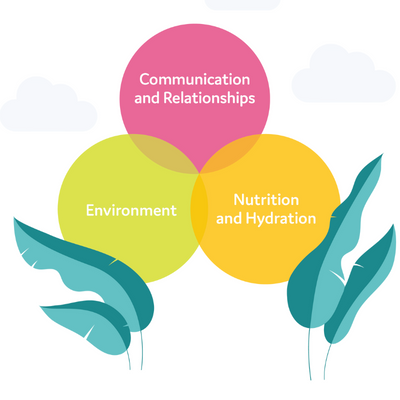Our Dementia Priorities
It is possible to be happy and live well with dementia. However, many residents will not always feel comfortable or content. Often this may be because their needs are not met, which can result in residents feeling a range of confusing and frightening emotions. When caring for our residents who are living with dementia, we have three main areas of focus that we keep in mind: Communication & Relationships, Environment, and Nutrition & Hydration.
This focus helps us deliver care that is centred to each individual and their needs, taking into account their type of dementia, their personality, and what they like and dislike. With this in mind, we’re able to care for and support each resident individually with an approach that best reflect their needs.

Communication and relationships
Living with dementia can affect an individual’s ability to respond appropriately or follow a conversation. This could be because they do not understand what you have said, have less ability to keep focused or are unable to put the correct words together as a reply. There may eventually come a time when our residents can no longer communicate as they once did. Some common barriers to communication include language, accent, hearing and sight loss, environment, and speech difficulties. This can be distressing and frustrating for them, but there are ways to keep communicating.

Our approach to dementia care provides our team with the tools and techniques they need to better communicate with individuals with dementia. Sometimes it’s little things that act as a trigger. Our homes with Dementia Champions may offer a dementia workshop session for families all around communication and our overall approach.
A person with dementia may think more slowly, lose focus or not be able to understand complex ideas. For example, they may take longer to process thoughts and work out how to respond to what is being said. They may also move from one topic to another without finishing a sentence as it becomes harder for them to focus.
Residents with dementia often struggle to express their feelings verbally as they once did. Their way of showing loneliness, fear, frustration, or anger may differ from before. Our teams providing dementia care use positive interactions, reflect words through body language, and employs tools like memory collections, life story books, and music to help communicate.

According to Mehrabian’s Communication Model, when we express our feelings, only 7% of our communication is in the words that we are saying. Although residents with dementia may have more limited verbal abilities, they can still express their feeling through their body language and behaviour. Our dementia approach helps our team identify and understand communication and behavioural triggers to better understand what each residents is trying to communicate.
Environment
Our care home environments can have a huge impact on the wellbeing of our residents. Due to changes in the brain, colour schemes and design features that might appeal to us, can make everyday life for some people living with dementia confusing and difficult to manage. Getting the design right for people living with dementia can reduce the number of falls, reduce the use of some medications and improve morale.

At Four Seasons Health Care Group we have researched the impact of environment on those with dementia. We have developed guidance to help us make positive choices when refurbishing or redecorating our homes.
There are some key principles we try to work to:
- Avoid using heavily patterned wallpapers.
- Plain coloured carpets.
- Colour schemes with a good contrast between walls, flooring and handrails to help residents navigate more easily and orientate themselves.
- Use matt paints where possible and flooring that doesn’t reflect too much light.
- Create themed areas, such as the seaside or music, and where possible use signage to help residents easily navigate their way around.
In all our homes we try to create a place to live that is homely, familiar and personalised to the individual.

We are mindful that a change of environment could cause increased stress or confusion to those moving into our care homes for dementia care. This is why we ensure all team members focus on building relationships with new residents, and ensuring there are familiar items in their bedrooms such as photos, ornaments or even furniture, perhaps their favourite armchair – whatever can help our residents to feel at home. This can help someone settle in much quicker and also provide helpful conversation starters for any visiting family members.
Nutrition and hydration
Living with dementia can affect an individual’s ability to respond appropriately or follow a conversation. This may happen because they don’t understand what was said, have trouble staying focused or struggle to find the right words. Over time, residents may lose the ability to communicate as they used to. Common communication barriers include language, accent, hearing and sight loss, environment, and speech difficulties. This can be distressing and frustrating, but there are ways to maintain communication.
Eating and drinking well are essential for health and wellbeing. As dementia progresses, some may face challenges with this basic need. They might not recognise food and drink, lose appetite, or have trouble swallowing. To prevent malnutrition or dehydration, we use ‘Personal Food Passports’ as part of residents’ care plans. A copy is also kept with our Chefs. These passports detail each resident’s personal ‘food story’—likes, dislikes, eating habits and dietary needs. This can include simple choices like tea or coffee preferences, sugar amounts, and whether they like gravy with their meal.

In addition, the passport covers any support that particular resident needs to eat well, for example if they need a quieter space, or they prefer to eat smaller portions at a main meal. This information is helpful to us not only to ensure their preferences are met at meal times, but also so we can gain an insight into what their eating pattern may have been like before the onset of dementia, and how it may have changed.
Our Chefs have also been trained in how to offer modified diets including soft diets for those with swallowing difficulties. They have amazing ways of making soft diet food look just like normal food and very appetising. Our Dementia Champion programme helps the wider team understand how simple changes to mealtimes and hydration can positively impact how and whether a resident enjoys meals and drinks.


